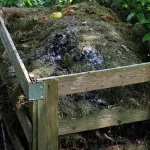Composting is an eco-friendly way to recycle organic waste into nutrient-rich soil, but waiting for the decomposition process can be a test of patience. Understanding the fundamentals of a balanced compost pile and using specific techniques can significantly speed up this natural process. This article will explore essential tips and tricks to accelerate compost decomposition timeframe, including maintaining a balanced pile, selecting key ingredients, considering seasonal impacts, employing effective techniques, and troubleshooting common issues that slow composting.
The Essentials of a Balanced Compost Pile
Creating a balanced compost pile is crucial for achieving faster decomposition. A well-balanced compost pile needs a harmonious mix of green materials (rich in nitrogen) and brown materials (high in carbon). Green materials include kitchen scraps, grass clippings, and coffee grounds, which provide the necessary nitrogen for microbial activity. In contrast, brown materials like dried leaves, straw, and cardboard supply carbon essential for energy.

Layering these materials is key. To maintain the right balance, aim for a ratio of approximately three parts brown to one part green. Too much nitrogen can make the pile slimy and smelly, while excessive carbon can lead to slower decomposition.
Aeration is another critical factor. Regularly turning the pile introduces oxygen, which microbes need to break down organic matter efficiently. Watering the pile occasionally ensures it stays moist but not soggy; think of the consistency of a wrung-out sponge.
Incorporating these essentials, balanced green and brown materials, proper aeration, and moisture creates an environment where beneficial microorganisms can thrive. By managing these elements thoughtfully, you set the stage for a compost pile that breaks down quickly, turning kitchen and yard waste into rich, fertile compost in a shorter time frame.
Key Ingredients to Accelerate Compost Breakdown
Accelerating compost breakdown relies on the right mix of ingredients. To begin with, ensure you have a balanced ratio of greens (nitrogen-rich materials) and browns (carbon-rich materials). Greens include kitchen scraps like fruit and vegetable peels, coffee grounds, and grass clippings. Browns consist of dry leaves, straw, and cardboard. The ideal ratio is roughly 2:1, with twice as many browns as greens.
Next, add moisture to your compost pile. A too dry pile will decompose slowly, whereas too much water can lead to anaerobic conditions and odor. The goal is to maintain a consistency similar to that of a wrung-out sponge.
Additionally, consider incorporating compost accelerators like manure or commercial compost starters. These contain high levels of microbes that speed up the decomposition process. Chop or shred larger materials before adding them to the pile; smaller pieces break down faster due to increased surface area.
Lastly, oxygen should be introduced by regularly turning the compost heap. Aeration prevents the pile from becoming compacted and supports aerobic decomposition. By carefully managing these key ingredients, you can significantly speed up the composting process and produce nutrient-rich compost in less time.
Seasonal Impacts: How Summer Affects Composting Speed
Summer is an ideal season for composting due to warmer temperatures, which significantly expedite decomposition. During this time, microbial activity in your compost pile can surge, thanks to the heat that helps break down organic materials more swiftly. To harness this seasonal advantage, ensure your compost pile remains moist, as high temperatures can quickly dry it out. Regular watering and turning the pile will help maintain the necessary moisture balance.
Moreover, summer's longer days and increased sunlight contribute to a rise in internal compost temperatures, sometimes reaching optimal levels of 135-160°F (57-71°C). This heat speeds up decomposition and effectively kills weed seeds and pathogens. It's essential to monitor the pile to prevent it from overheating, which can hinder microbial activity. If you notice excessive heat, turning the pile can help dissipate it and reintroduce oxygen.
Additionally, the abundance of garden waste, such as grass clippings, pruned leaves, and spent plants, provides a rich source of nitrogen, an essential element for rapid composting. Combining these green materials with carbon-rich brown materials like dried leaves or straw can create a balanced mix that fosters faster decomposition during the summer months.
Effective Techniques to Maintain Optimal Compost Conditions
Maintaining optimal compost conditions is crucial for quickly speeding up decomposition and creating nutrient-rich compost. To achieve this, start by regularly turning your compost pile. This aerates the material and introduces oxygen, vital for the aerobic bacteria that break down organic matter. Aim to turn your compost every 1-2 weeks to keep it well-mixed and aerated.
Next, ensure your compost has the proper moisture level. The material should be damp, like a wrung-out sponge. If it's too dry, decomposition will slow down; if it's too wet, it can become anaerobic and start to smell. Add water if your compost seems dry, or add dry browns like leaves or straw if it’s too wet.
Temperature is another critical factor. A healthy compost pile should maintain an internal temperature of 135-160°F (57-71°C). This high temperature is essential for breaking down materials quickly and killing off weed seeds and pathogens. You can use a compost thermometer to monitor this and adjust as needed by adding more greens (nitrogen-rich materials) to raise the temperature or turning the pile to cool it down.
We can create an efficient, fast-decomposing compost pile by staying attentive to turning, moisture, and temperature.
Troubleshooting Slow Compost: Common Pitfalls and Solutions
Even the most well-constructed compost piles can experience slow decomposition, leading to frustration. Identifying and resolving common pitfalls can help you speed up the process. One frequent issue is an imbalance in the carbon-to-nitrogen ratio. Too much carbon-rich material like dried leaves or paper can make decomposition sluggish. Ensure a good mix by adding more nitrogen-rich items like grass clippings or kitchen scraps.
Another common problem is insufficient aeration. Composting microorganisms require oxygen to thrive, and a poorly aerated pile can become compacted and anaerobic. Regularly turn your compost to introduce air, using a garden fork or a compost tumbler.
Moisture levels also play a crucial role. A pile that’s too dry will stall microbial activity, while one that’s too wet can become waterlogged and smelly. Aim for a moisture level akin to a damp sponge by watering sparingly and covering the pile during heavy rain.

Lastly, avoid adding slow-decomposing materials, such as large branches or thick paper. Chopping or shredding these items can significantly speed up the process. Addressing these common issues will create an efficient, faster-decomposing compost pile.
Speeding up the composting process doesn't have to be complicated. By creating a balanced compost pile, incorporating the right ingredients, and adapting to seasonal changes, you can significantly enhance the breakdown of organic materials.
Maintaining optimal conditions through regular aeration, moisture management, and temperature monitoring will further expedite decomposition. Troubleshooting common issues such as improper carbon-to-nitrogen ratios or inadequate aeration can prevent delays and ensure your compost pile remains active and efficient. Implement these tips and tricks to transform your waste into valuable compost swiftly.

Lifelong bacon junkie. Lifelong internet fanatic. Hipster-friendly travel aficionado. Twitter lover. Avid food buff. Incurable travel trailblazer.













